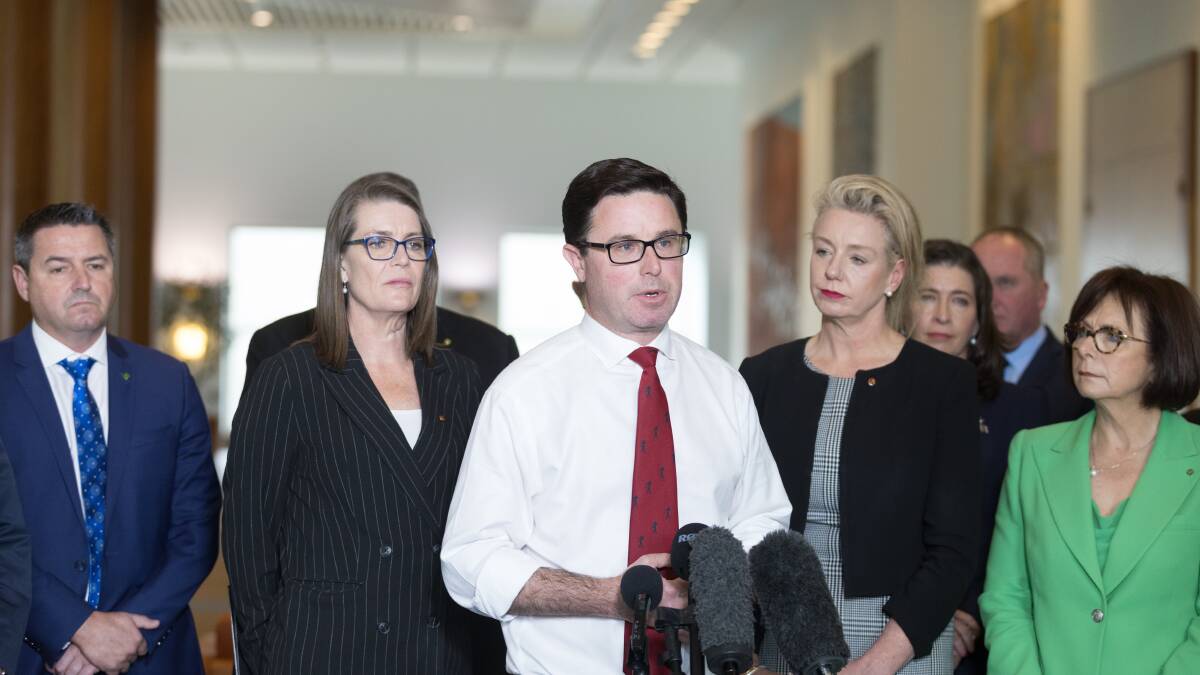The decision by the Nationals to oppose the Voice to the Australian Parliament referendum caps off a mixed year for the party.
Subscribe now for unlimited access.
$0/
(min cost $0)
or signup to continue reading
It may be bad judgement and turn out to be an awful political mistake, but it does illustrate the potential influence the party exerts in Australian politics. It also shows their confident determination to make their mark.
Only time will tell whether they have judged the electorate correctly.
The decision itself seems odd in several ways. It is strange from a Coalition point of view that the Nationals chose not to present a united front with the Liberals or at least collaborate with them in terms of timing and approach.
It is also strangely premature, as the ABC's Laura Tingle has commented, in that the decision was made very early in the campaign process.
Both aspects may be explained by their determination to project themselves as an independent conservative actor within the party system.
There are two quite different sides to the Nationals' year.
They have been quite successful electorally, while the Liberals have floundered. At the May federal election they held all their House of Representatives seats, fighting off challenges not just from Labor, but also from some independents.
This was against the national trend which saw Labor victories and teal independents gains in metropolitan areas, both at the expense of the Liberals.

The same has just happened in the Victorian state elections to great surprise. Not only did they hold all their six Legislative Assembly seats while Dan Andrews was easily elected for a third term, but they won back three additional seats from independents in Shepparton and Mildura and from a retiring independent in Morwell. Once again this was firmly against the state trend.
These electoral performances must make the Nationals extremely confident that they are successfully representing rural and regional Australians.
Why wouldn't they believe that their policy stances are correct and that their rural and regional constituency is rusted on rather than rusted off as influential commentators have suggested. The results speak for themselves. Or do they?
The federal election result saw the Nationals highly unpopular leader, Barnaby Joyce, replaced by David Littleproud. That was one indication that all was not rosy in the Nationals' camp.
In Victoria one Nationals' member suggested that the state Coalition agreement with the Liberals should be re-evaluated after yet another Coalition defeat.
Despite their own electoral success, the Nationals are out of office federally and in Victoria. Not only does that defeat the purpose of its election success, but at the national level, at least, the Nationals contributed to the defeat of their Coalition partner.
In metropolitan electorates the campaign slogan of Labor and Independent candidates became "a vote for the Liberals is a vote for Barnaby Joyce". What he stood for was on the nose.
The slogan was not just a campaign gimmick but encapsulated an undeniable truth. The Nationals, as fellow commentator, Crispin Hull, has noted, have prevented the Liberals from moving towards the centre ground with more moderate policies. Much of this happens behind closed doors, but some of it can't be hidden.
The deals behind closed doors are written into the Coalition agreement signed off before each Coalition government takes office. Successive Liberal prime ministers have been hamstrung.
Malcolm Turnbull gained the Liberal leadership only by promising to adhere to more conservative policies on water, same sex marriage and climate action. The deal ultimately damaged his image among moderate voters who wanted progressive government, and ultimately was not enough to save his leadership anyway.
More recently the Nationals held the Morrison government to ransom over Australia's emissions reduction targets prior to COP26. They only finally agreed to zero emissions by 2050 in return for compensatory benefits to their rural and regional constituencies.
The deal itself was not made public, but subject to cabinet secrecy. If anything, this was a double whammy for metropolitan voters: rubbery targets and secret deals. They were not impressed and voted accordingly.
Not only did the Nationals suffer when the Coalition lost office, but the deal was unpicked anyway in the first federal budget after the Albanese government came to office.
This background of mixed Nationals' success and failure in 2022 is the context for their rejection of the Voice. The immediate and long-term response of Nationals and other voters will be fascinating. Let's see what the response of regional and rural communities is to their decision.
READ MORE:
The same is true of the peak mining and farming groups which normally align with the Nationals and of the party's corporate backers.
The Liberals haven't announced their decision on backing the Voice. Opposition Leader Peter Dutton wants to wait before committing himself.
The negative position taken by their partners, the Nationals, makes it less likely that the Liberals will back it. If they do, dangerous strains within the Coalition are almost certain. If they don't, prospects for the "yes" vote look dire.
The initial impact will be on the referendum campaign itself even if the support of Dutton and the Liberals is forthcoming. Bipartisanship or even multi-partisanship on the "yes" side is regarded as necessary for referendum success. Labor-Liberal-Green-teal multi-partisanship without the Nationals may still be just enough for success.
The longer-term impact will be on the 2025 federal election. Will their failure to back the Voice make a difference to the appeal of the Nationals in rural and regional Australia and, more importantly, of Liberals in the cities?
- John Warhurst is an emeritus professor of political science at the Australian National University.


